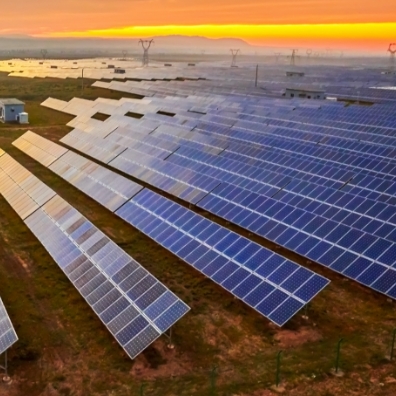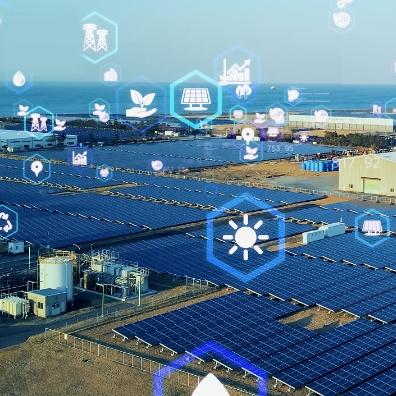Ever since the conceptualisation of the United Nation’s Sustainable Development Goals (SDGs) in 2015 and even the 1997 Kyoto Protocol, reducing carbon emissions has been a focal point in tackling the adverse consequences of climate change. This is a call that both the public and private sectors must respond to with increased force, with Hitachi playing our part to achieve carbon neutrality across all our business sites by effectively reducing carbon emissions by 100 percent by 2030.
Coinciding with the 2030 deadline of the UN’s SDGs, Hitachi seeks to realise carbon neutrality at all its business sites (including factories and offices) by effectively reducing emissions by 100% by fiscal year 2030i. At the same time, our organisation has continued to roll out de-carbonisation initiatives, particularly throughout fast-developing regions such as Southeast Asia which are especially vulnerable to climate change.
The first step to decarbonisation is minimising the use of existing fossil fuels – which can be done by optimising resource allocation.
As one of the largest sources of carbon emissions, transport systems are due for a much-needed transformation to significantly reduce their carbon footprint. By facilitating optimal resource allocation, Hitachi’s logistics vehicle sharing initiative seeks to reduce the man-hours and overall fuel use of transport operators. The initiative has generated a service that can collect, integrate and analyse data such as vehicle operational status and cargo availability across multiple touchpoints to dispatch an appropriate vehicle for each delivery order.
With vehicle sharing, the logistics sector can optimise vehicles to perform multiple joint deliveries for cargo located in close proximities. Such efficient use of transport allocation reduces the instances of using excess fuels, which can alleviate air pollution in traffic and can be taken as a proactive step in lowering the demand for fossil fuels in the long haul.
The next element of de-carbonisation involves the use of alternative and renewable energy sources. Solar energy has been emerging over the past decades as a top choice for renewable energy. Hitachi has capitalised on this growing preference through its partnership with SANTEC and Mitsubishi HC Capital (Thailand) to install solar self-consumption equipment at no cost to its customers. Under this agreement, customers can benefit from the the solar power produced at a low, affordable rate.
Efficient and economical, the system’s emission-reducing capabilities will be a crucial contributor to Thailand’s power development plan that aims for the share of renewable energy to be 34 percent of the country’s total power generation capacity in 2037.
 Affordable Renewable Energy
Affordable Renewable Energy
 Energy-Efficient
Energy-Efficient
 Contributes in Decarbonisation
Contributes in Decarbonisation
While solar energy sources inherently hold immense decarbonising potential, how can countries cement a sustainable adoption of solar power to sustain their de-carbonisation? The answer lies in infrastructure.
To achieve Singapore’s national target of having 80 percent of buildings being green by 2030, Singapore’s Building & Construction Authority enlisted Hitachi Asia’s help to develop the Super Low Energy Building (SLEB) Smart Hub, a digital resource centre for smart and energy-efficient technologies to improve energy usage optimisation across the city-state’s urban landscape.
Hitachi Energy has also been instrumental in Singapore’s decarbonisation plan through its partnership with the Energy Research Institute at Nanyang Technological University (NTU) in the development of the country’s first Virtual Power Plant (VPP). Hitachi Energy contributes to the VPP project with an e-meshTM PowerStoreTM battery energy storage system (BESS) that provides grid stability by automatically balancing potential energy fluctuations resulting from solar intermittency through energy management and optimisation software.
Energy-efficient infrastructure fosters a more agile energy supply that supports energy conservation. This ultimately optimises the harnessing of energy, creating a more sustainable pathway towards a net-zero future.
Hitachi is reaffirming our commitment towards the 2030 zero-carbon race through our region-wide efforts to introduce green solutions. We are also establishing ourselves as a global ally towards decarbonisation in our role as the Principal Partner for the 26th UN Climate Change Conference of the Parties (COP26).
We have undeniably faced our fair share of challenges when implementing several of our solutions, be it geographical or operational challenges. However, as we remain driven towards our carbon reduction goals, these constraints have only emboldened us to continue moving forward towards championing environmental and social development in our efforts to truly lead the world to a more sustainable future.
Being a global ally to build a sustainable zero-carbon future, now and forever.
iAs compared to FY2010 levels
Date of Release: February 2022
Updated: March 2022